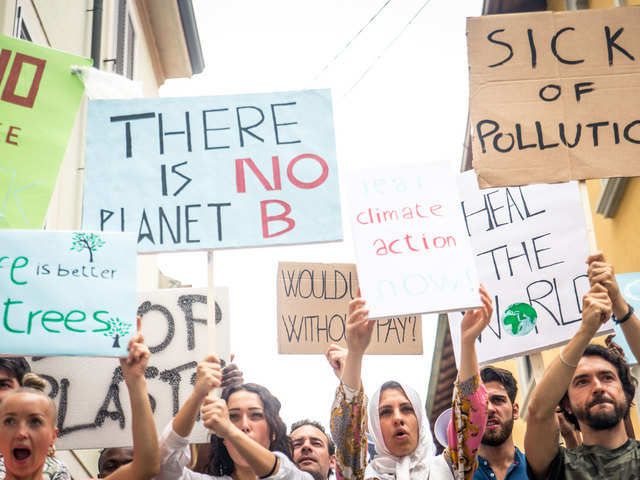
This text provides an intervention on the broad political debate taking place regarding the social effects of climate change. Ecological movements have made this issue a fundamental political question for many years now, yet the transnational presence of a generation in revolt has up until today become unquestionable. In the last few years, this young generation – currently organizing ahead of Cop26 to be held in Glasgow in November – has given life to the global climate strike. With the claim of “climate justice,” their collective demand is a refusal to give up on their future, to allow their future to be stolen. Whilst calling for institutions to take a stand, they are nevertheless unwilling to wholeheartedly believe the promises of these institutions, whether national, international, scientific or political. It is clear that it won’t be these institutions to offer solutions for change, given that they are already rebuilding their legitimacy in the name of a profit-driven ‘ecological transition’. The ecological transition is therefore a battlefield which cannot be practised by a single generation: it reshapes the boundaries and possibilities for social movements and it unequivocally demands for a stand to be taken. By stating that ecology sets up a new regime of capital accumulation, and a new ecological governance, we attempt to describe how social production and reproduction are undergoing rearticulation as a result of climate change. Equally we seek to identify the fracture lines against which a political initiative can be practiced. Ultimately, the task of the protection of Nature does not turn us into a united and homogeneous subject, given that each of us are differently impacted by climate change’s effects. As a matter of fact, the ecological regime of accumulation produces and reproduces differences and hierarchies that cut through the transnational space that the generation in revolt calls “Earth.” Thus, our ecologism must be able to grasp the lines of conflict within this transnational sphere and struggle for capitalism’s green transition to be a collective one, all in order to affirm our refusal to submit to the conditions imposed by the ongoing transition.
***
1. The ecological regime of capital accumulation is a battlefield where partisan struggles take place, rather than the reunification of a universal subject.
Ecology is a fundamental battlefield nowadays. It points to a series of global questions about how States and capital are adjusting themselves to climate change. It also requires the development of a critical and partisan standpoint for dealing with these changes. For us, ‘ecological’ is firstly and foremost the specific feature of a new regime of accumulation, and we call ‘ecologist’ those struggles which are produced within this new regime and which challenge its universalistic presumption.
If “ecological” is a whole regime of accumulation, we cannot limit ourselves to dream about a lost harmony with nature, as if this had not been plundered for centuries by capital. This means that our ecologism cannot rest on the normative idea of ‘Nature’ as an object to protect and save from human beings’ or capital’s violence. Capitalist valorisation of Nature makes it a site of struggle before one of reunification. Nature does not escape capitalism’s grasp: it is thus caught in an unstable and changing relationship with the global mode of production and inserted within a social relation of domination.
Given that ecology represents the testing ground for new modes of capital accumulation, the ecological transition will not produce the unification and reconciliation of humanity around a common cause, but rather inequalities, criticalities, divisions, and hierarchies. The different environmental policies on the agenda show more than ever the various differences which crisscross and constitute the ecological universal.
Insofar as the transition to the ecological regime of accumulation produces inequalities among states, metropoles, individuals, and working conditions, it thus codifies the transnational space as a hierarchical and disputed one. The transition is therefore the process through which capital tries to design the green environment that is needed for its reproduction. Within the ecological transnational space, states (and unions of states) sign agreements over – or wage wars on – obtaining resources whose control grants huge profits; it is thus within this field that tensions between the general level of capital valorisation and its specific ecological dimensions arise. The ecological transnational is also a space where finance intervenes to valorise capital’s investment towards ecological conversion or to intensify the coercion to work and the dependency on capitalist command. The adjustment to climate change is the transition’s long-term outcome, and now tends to impose on everyone the necessary discipline to adapt to the transition. The ‘naturalisation’ of such foreseen conditions by way of this adaptation thus becomes a pivotal moment of social reproduction on a global scale.
2. Climate science does not offer an indisputable ground for a global government of the ecological transition.
Although it has been mocked by a sceptical opinion that does not spare any scientific authority, climate science has been equipping itself for years with instruments and political organs that define a wide field of expertise, such as to express judgments on the direction the ecological governance should take. The last IPCC (Intergovernmental Panel on Climate Change) report did not turn the field of climate science upside down; nonetheless, it did highlight the fundamental link between science and the political conditions of its production, that is how climate science is an essential element in the complex process of transition toward an ecological regime of accumulation. Though the ecological transition has sometimes been defined as a ‘green revolution,’ it does not bring about any radical or sudden departure from the old regimes of accumulation, nor from the scientific knowledge that has made those regimes possible.
The market demands a high degree of innovation and green skills that influence scientific production and gives to it a specific political direction – e.g., from the founding of basic research to maxi-experiments on new low-cost energy sources, which are carried out in large research centres, both public and private, mainly funded by those multinational corporations operating in the sector. Supranational bodies (with the EU at the front line) mostly rule the roost dictating this direction, thus securing themselves a special place in profit’s variable geographies, paving the way for an uneven, disordered, or softly planned accumulation, which will certainly not lose its hierarchical feature. The transition that climate science prescribes does not happen anywhere in the same way: some polluting factories must be saved, and while the ecological conversion takes a very long time, the needs of valorisation are already dictating the pace for capital’s green metamorphosis. If a coherent global governance of climate is impossible, because capital operates by exploiting transnational differences and unevenness, then the multiple existing “truths” on climate change shed a light on the unsolvable tensions between national governments and instances of global governance.
Thus, climate science is neither a demon to be exorcised, nor a fortress to be protected; at the same time, it can hardly represent that oracular knowledge that grounds a universal standpoint that can just be embraced in front of the looming environmental catastrophe. Giving battle on science thus means affirming the need to overthrow the social conditions which make science a key element for the reproduction of capital, and which prevent a radical innovation of society. It finally means determining the conditions of possibility for a partisan use of science.
3. Finance is a fundamental pivot of the ecological regime of accumulation, through which capitalism gets rid of its accumulated general problems.
Finance is an instrument of capitalist adjustment to the crisis that has undermined States’ fiscal capacity, and thus their national sovereignty. Even when coloured in green, finance expresses a transnational force that hits national territories. This forbids conceiving the ecologist struggle as the sum of local fights for the protection of territorial resources. Under the ecological regime of accumulation, what happens within single territories does not depend on their borders, nor can be confined within these. Therefore, the protection of nature cannot be the basis for a strategical reactivation of a national democratic representation, so much as nature per se cannot be the universal reference point for ecologist struggles. The critique of green finance leads us to consider the transnational dimension of the ecological crisis and to look for possible connections within that space.
The financial bet on environmental risks’ profitability is not only the neoliberal answer to climate change but also the sign of the emergence of a new regime produced by that very crisis. Ecological governance acknowledges the need for financial innovation based on the increased risks and possible costs of enterprise. While some heads of State deny the truth of climate change to preserve specific industrial sectors, finance has been the first sector to seize the opportunity to capitalise on the environmental crisis. Insurances on goods endangered by possible destruction due to climate change generate profits for capital. During the last ten years, the neoliberal insurance system has been the driving force and trigger for the ecological regime of capital accumulation, its artillery consisting of several weapons – cat bonds, carbon markets, weather derivatives, biodiversity banking.
4. Within the ecological regime of capital accumulation, migrant labour is pivotal to fulfil the adjustment of economies to climate change.
Governing migration is a crucial point in ecological governance, which is moved by the fantasy that climate change can be managed as a zero-sum game and with variable geometries of accumulation. For years, in their exclusive clubs, distinguished jurists and legislators have debated the legitimacy of the category of ‘climate refugee.’ This has then been superseded by the category of ‘environmental migrant’, with which Western legal systems now frame migrants coming from areas made inaccessible by an environmental disaster. It was not simply a matter of names: it displayed the need to design the laws to be applied to a migrant coming from a desertified or flooded area and, consequently, what value to assign to that migrant.
As already announced in the recent European Pact on Migration and Asylum, the governance of migration is increasingly taking the shape of a clash between migrants’ freedom of movement and the attempt to valorise their presence within the framework of a regimented mobility. The recent International Organization for Migration reports on the relationship between migration and climate change manifest the intent to coordinate the opportunity of exploitation of migrant labour with the possibilities to invest capital opened up by the green transition. On the one hand, these reports recognize that it is capital’s interventions that often cause the departure of many individuals from their birthplaces; on the other, it is argued that return-migration is to be encouraged where the ecological transition in the countries of origin requires skilled labour that would otherwise be unavailable. The answers that IOM proposes for the management of ‘environmental migrants’ are in line with the general perspective of a managerial government of migration, made up by agreements between macro-regions, and maximum flexibility in managing the flows, to allow great ease within changing scenarios. The main goal is the prevention of ungovernable autonomous migration by imagining migrants as assets of the new regime of accumulation. The multiplication of legal figures through which governments attempt to regulate the access of migrants to the labour market shows that migrant labour produces an internal tension within the ecological regime of accumulation.
5. The transition to the ecological regime of capital accumulation produces a green environment for capital.
Capital’s environmental crisis cannot be read through the categories of some physical limits to development. Capital does not die a natural death but transforms its conditions of reproduction by including the ecological element. Within this transformation, States continually confront their inadequacy: the ecological regime of accumulation is a drive to go beyond the political form of the State and thus to prefigure and strengthen institutions for supranational command.
By adapting its environment to new investment opportunities, the ecological regime of accumulation codifies the transnational space, thereby also changing the internal organization of national States. The NRRP (National Recovery and Resilience Plans) are precisely national plans framed within a supranational political command that dictates their purpose and guarantees the conditions for its possible implementation. For this reason, our critique of the transition – which is a transition of capital, therefore profit-oriented – cannot stop at the thresholds of national borders: it must measure itself with the transnational dimension of capital and the hubs of climate governance.
For example, mission n. 2 of the Italian NRRP’s green revolution and ecological transition focuses on energy saving and the use of alternative resources, in addition to the ‘classic’ waste disposal and buildings’ requalification. These are clear adjustment strategies to the crisis, not attempts to mitigate it. In Italy, the central issue concerns energy infrastructure and the costs for reskilling a ‘green’ workforce. Infrastructure and a qualified workforce are the ‘environmental’ conditions lacking even in those sectors where the necessary technologies already exist, and innovative products are ready to be sold on the market. From this point of view, the transition signals the obsolescence of the State as the political organizer of accumulation, as well as that of those companies unable to move towards new competitive forms of capital valorisation and which will be left at the post. Like every regime of accumulation, the ecological one also uses specific forms of coercion to force millions of individuals – men and women – to labour in social production and reproduction. These will be the constitutive elements of the green environment of capital, as well as of its material contestation.
6. The ecological regime of accumulation valorises old hierarchies while producing new ones, as demonstrated by “Green Europe’s” investments and its relationships with its borders.
Despite presenting itself in the guise of a universal necessity, the ecological regime of accumulation acts within a hierarchical political space, with conflicts or agreements between states and supranational actors for appropriating the resources needed for the green transition. The relationship between Europe and its Eastern region, both within and outside the EU, makes evident the problem of reproduction of old hierarchies, and affirmation of new ones. The EU Mechanism for a Just Transition represents the ideological face of ecological transition: while it is supposed to facilitate Eastern countries’ green transition, it actually serves to seize the opportunity to valorise capital and resources within the ecological regime. The transition is presented as a fair imperative capable of superseding the differences it encounters along its way; meanwhile, the European governance offers bonuses to accelerate the synchronization between the Eastern coal-fired economy and the demands for green accumulation of the rest of the continent.
The goals of the Green New Deal (climate neutrality by 2050), described in the Fit for 55 program for the reduction of emissions by 2030, must be protected from the ‘unfair’ competition of those who possess economically advantageous resources but with high environmental impact. This explains the rush to impose duties on the import of raw materials from Eastern Europe that, if left free to circulate, would slow down green transition’s pace. Therefore, the main hesitations towards the great plan signed by Von der Leyen come from those countries whose energy sector revolves mainly around coal (such as Poland) or import large quantities of this (Italy and others).
The Ukrainian and the Polish Green Deals do not establish any particular social protection measures for the transition to the new ecological regime of accumulation. The priority given to energy development – based on privatization and liberalization – will produce prohibitive costs for most of the population and transition times far removed from those of Central Europe. Poland plans to close its last coal mine in 2049, Ukraine in 2035, while Bulgaria has not yet had access to Recovery funds precisely because it is unable to put an end date on its mining production.
Between the European Union and its eastern borders there are relations of cooperation and tensions, crossed by multiple dividing lines that necessarily emerge when we leave the level of the universal value of the ecological transition to enter that of policies and unequal distribution of – and access to – resources.
7. The ecological regime is the chance for a new differentiated exploitation of resources: a new Scramble for Africa.
The transition to the ecological regime of accumulation provides the necessary capital to overcome the general crisis of accumulation, i.e., it aims to solve the practical problems of capital organization post-2008 crisis. Therefore, while it proposes to solve the environmental question, the transition provides for the regulation of resources necessary for the valorisation of capital in general. Thanks to the use of ecological capital, capitalism remains fossil in large areas of the world. Our ecologism must then come to terms with this structural difference that determines the positioning of millions of people worldwide. The ecological regime of accumulation has already been equipping itself with the administrative and governmental mechanisms that are necessary for the integration of different moments of production within the green market; still, this integration does not imply any progressive homogenization of the conditions of work and production.
As part of this global ecological governance, the European Green New Deal is conceived and exported to Africa to create new opportunities for European innovative economic investment and expanding access to its market. By financing sustainable innovation in African industrial and agricultural production, the EU exploits the extremely low labour costs to make African production marketable in Europe because it is suitable for its ecological standards. It is not by chance that the African Union has repeatedly requested to exempt exports from less developed countries from the carbon border adjustment mechanism.
In the name of ecological transition, the European governance of African resources has changed: they can now be obtained through green financing granted to the AU. This green financing extends the boundaries of the EU influence well beyond the Mediterranean, reorganizing processes and modes of production that were previously inaccessible to it: administration, agriculture, and finance.
Most of the AU Green Deal’s goals are consistent with companies’ interests so that the private sector can become a vehicle for AU-EU green cooperation – a business in which commercial opportunities come mainly from the private exploitation of renewable energy sources available on African soil; a business to be carried out at the expense of those who stem their livelihood from agriculture. As in other undergoing-innovation areas, the adjustment to green agricultural production will firstly mean the introduction of large amounts of capital and the expulsion of many people from production. For instance, in Modi’s India, ecology was the universal value invoked as a justification for moving forward the process of neoliberal transformation of the country’s social and productive fabric. It was the culmination of years of reforms that prepared the ground for the graft of green capital that today precludes millions of Indians from access to arable land. The 2020 peasants’ strike, while not constituting a paradigm for future class compositions under the command of ecological capital, poses for us the problem of the advancement of a partisan ecological universal.





